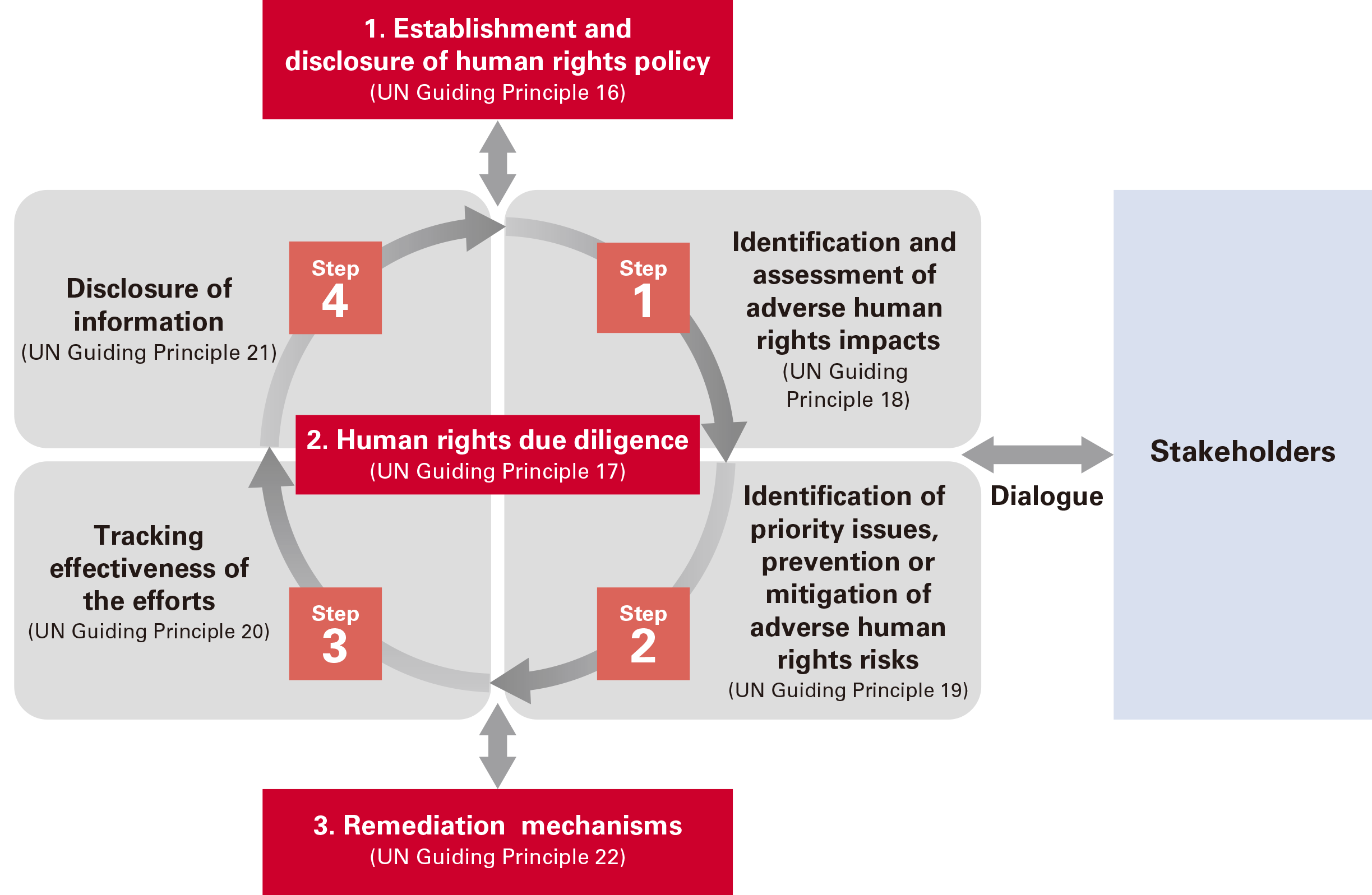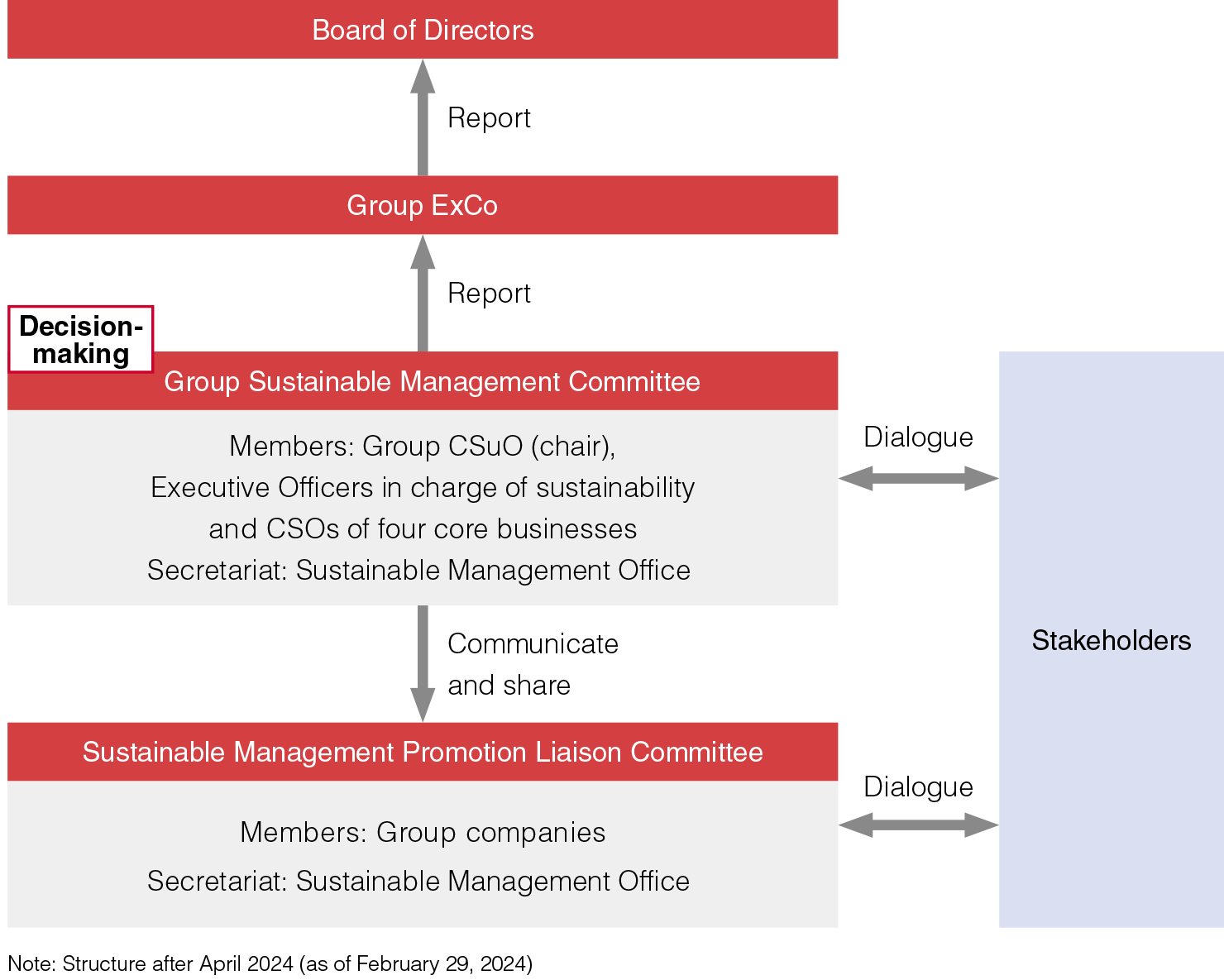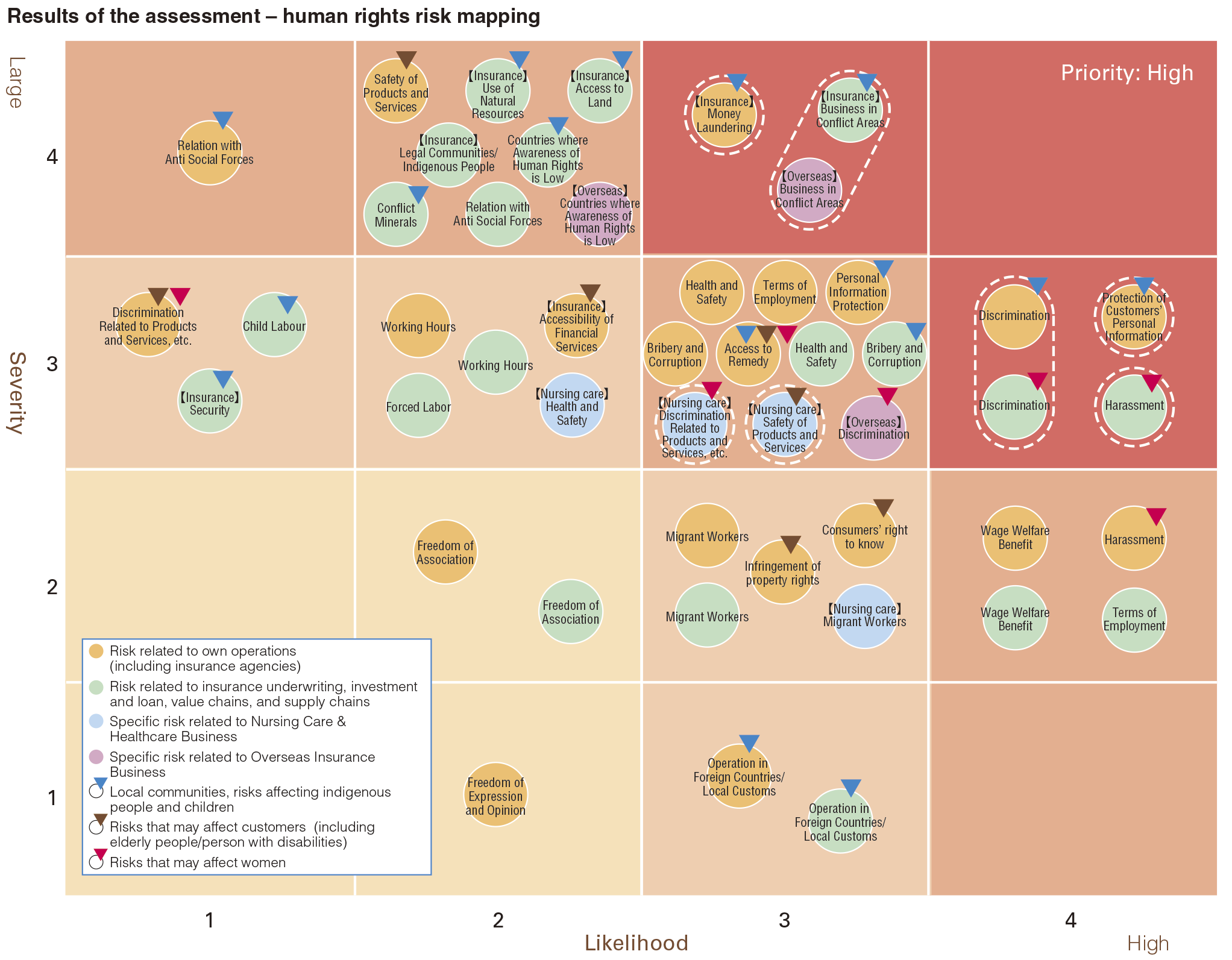Overall picture of human rights initiatives

To fulfill our responsibility to respect human rights, the Group is committed to: 1. Establishment and disclosure of human rights policy; 2. Human rights due diligence ("Human rights DD"); and 3. Remediation mechanisms.
In addition, we will also continue to engage in dialogue with stakeholders and make improvements based on the Group's situation.

Created with reference to the Ministry of Economy Japan Trade and Industry's “Reference Material on Practical Approaches for Business Enterprises to Respect Human Rights in Responsible Supply Chains”
1. Establishment and disclosure of human rights policy
In the Group Policy for Human Rights, we declares that we will respect the fundamental human rights of all stakeholders in the Group and in the global marketplace, including the value chain, and that we will act with high ethical standards to create a sustainable society, while respecting international codes of conduct.
The policy applies to all employees in the Group and we will make an effort to extend its application to suppliers, business partners and other stakeholders.
In addition, we do not tolerate any form of forced labor, human trafficking, child labor, discrimination or harassment, or any other practices that undermine human dignity.
We also respect fundamental rights concerning freedom of association and the right to collective bargaining in accordance with applicable local laws and regulations.
We will conduct procurement in accordance with the Group Sustainable Procurement Policy to ensure fair and equitable transactions with all suppliers, while giving due consideration to human rights and preventing corruption at suppliers and business partners.
Related policies
Promotion structure
To encourage appropriate responses to ESG issues, including human rights, we have established a promotion system centered around the Group Sustainable Management Committee – the driving force behind Group-wide sustainability efforts.
The committee functions as the decision-making body on Group sustainability issues and is chaired by the Group CSuO. Its members comprise the CSuOs and CSOs of the four core businesses – Sompo Japan Insurance, Sompo International, Sompo Himawari Life Insurance, and Sompo Care. As the committee communicates and shares decisions with the Sustainable Management Promotion Liaison Committee under its umbrella, a framework is in place for implementing measures on a Group-wide basis. In addition, the Group has established a system under which matters discussed and reported at the committee are regularly reported to the Board of Directors via the Group Executive Committee.
Regarding human rights issues, the Sustainable Management Office, which serves as the secretariat of the committee, plays a central role in establishing an effective internal system in light of stakeholder opinions. We believe it is important to continuously improve on our priority issues and the status of our initiatives, and to disclose the status of these efforts.

2. Human rights due diligence
In accordance with the UN Guiding Principles on Business and Human Rights, the Group has established a human rights due diligence (human rights DD) framework for identifying, preventing, mitigating, implementing appropriate measures, and disclosing information on risks that adversely impact human rights with the following four steps.
We also recognize that the human rights situation is constantly changing, and we need to address it in a regular, iterative and increasingly in depth.
Human rights DD processes
Step1 Identification and assessment of adverse human rights impacts (Risk assessments)
The Group utilizes the Enterprise Risk Management (ERM) framework to identify "potential impacts and risks related to respecting human rights" that may occur in all of its businesses to identify priority issues and work to assessment.
In identifying human rights risks, we use various international guidelines such as the UNEP FI Human Rights Guidance Tool for the Financial Sector, and the CSR procurement self-assessment questionnaire published by the UN Global Compact Network Japan.
Human rights risk mapping
Based on the risk assessment conducted for the entire Group, we analyze the degree of adverse impact once a year, using severity*1 and likelihood of occurrence*2 as the evaluation criteria in order to identify issues to be addressed as a priority.
In our FY2024 human rights risk evaluation, we identified new human rights risks, including health and safety, harassment, leakage of personal information and privacy violations of employees and others, and respect for human rights and prohibition of discrimination related to products and services, and organized these risks from multiple perspectives.
- Evaluated based on scale (gravity of the adverse human rights impact), scope (scope of the adverse impact), and irremediability (difficulty of restoring to the situation equivalent to the situation before the impact).
- Evaluated based on the likelihood (frequency) of the risk actually occurring, i.e., whether it occurs approximately once every n years.

Step2 Identification of priority issues, prevention or mitigation of adverse human rights risks
Based on the results of the risk assessment, we will prioritize addressing the high-priority risks from the human rights risk map in the fiscal year 2024.
Prevention or mitigation initiatives
- Human rights awareness training for all group employees
We conduct Sustainability and Human Rights Training (including e-Learning) for Group employees every year to further deepen employee mutual understanding for respecting human rights and to create a rewarding, comfortable, lively, and energetic workplace.
In addition to familiarizing employees with the Group Policy for Human Rights the training includes an overview of Business and Human Rights, while also covering a broad range of many human rights issues that reflect social issues, such as normalization of people with disabilities, LGBTQ+, harassment, foreign residents, and the SDGs.
- Training for Group Directors and Executive Officers
The Group held a training session for Directors and Executive Officers to enhance understanding and awareness of diversity across the entire Group.
- Insurance underwriting, Investment and Loan Initiatives
As part of our efforts to mitigate human rights risks through insurance underwriting and investment and loans, we identify businesses that require caution with regard to insurance underwriting and investment and loans that may have an adverse impact on the environment and society. We take careful actions after evaluating the adverse impact on the environment and society. In identifying specific cases within the applicable businesses, we conduct assessments after engaging in dialogue with our stakeholders.
- Health & safety in the workplace and wellness management initiatives
Based on our health and productivity management strategy, we are working to ensure health and safety in the workplace and maintain and improve our employees’ wellbeing. We set KPIs based on the results of risk assessments and priority issues presented at the Group Health and Productivity Management Promotion Headquarters Committee, and monitor the results of measures that have been implemented to verify how effective they have been.
In the FY2024 human rights risk assessments, 79.5% of all our organizations identified "long working hours for employees and workers in the supply chain" as a risk. All affected organizations developed and implemented measures to mitigate the risk of long working hours.
Step3 Tracking effectiveness of the efforts
Field survey on initiatives for respecting human rights
We conduct human rights risk assessments for all of the Group's businesses. Each company and division identifies its own human rights risks and formulates plans, including corrective measures, for identified human rights risks. The corrective measure formulation rate is 100%.
Step4 Disclosure of information
In line with Group Policy for Human Rights, we report on the progress of initiatives to address adverse impacts on human rights on our website and in our Sustainability Report. We also disclose our position on the UK Modern Slavery Act on our website. Through this type of communication, we are reviewing and improving our assessment process.
3. Remediation mechanisms
After comparing our internal reporting system with the eight requirements called for in the United Nations’ Guiding Principles on Business and Human Rights, we have recognized there to be some issues in terms of effectiveness that will require overhauling. For example, with regard to the requirement that the whistleblower system be "based on engagement and dialogue," we believe that it is necessary to build relationships with stakeholders and NGOs and emphasize dialogue and deliberation on the Group's systems and performance with regard to human rights initiatives.
Going forward, we will continue to work on improving access to redress, and by taking into account the requirements of the aforementioned Guiding Principles, we will take steps toward the establishment of an effective internal reporting system.
Receiving and addressing feedback and complaints
Each company in the Group receives complaints, including those relating to human rights, plus enquiries and feedback, from various stakeholders. For example, at Sompo Japan Insurance, an expression of dissatisfaction from a customer regarding any aspect of the Group’s business is considered to be a complaint. We take all of the complaints received from customers very seriously and by recording the details of complaints and analyzing them, we can seek ways to improve our operations, products, and services.
Reporting and consultation system from employee and corrective measures
In addition to providing a reporting and consultation desk for general compliance issues, the Group has established a human rights consultation desk that accepts individual consultations by phone or e-mail to create a comfortable working environment by quickly identifying information on harassment, bullying, and other problematic behaviors in the workplace. In addressing the issues, we check the intentions of the person reporting or consulting with us while working to resolve the problem.
If any of the reports or consultations received are found to be in violation of laws and regulations, internal rules, or the spirit of the SOMPO Group Compliance Code of Conduct, we conduct a strict and fair investigation of the matter.
Also, in the event that a violation of applicable laws and regulations, the code of conduct or other internal rules is found, the offender may be subject to disciplinary action including dismissal based on the standards and requirements stipulated by the employment contract and employment rules of the Group Company.
Details of each reporting system
Dialogue with stakeholders
By engaging in dialogue with human rights-related NGOs and NPOs, the SOMPO Group deepens its understanding of various human rights issues, the relationship between such issues and the business activities of each company, and adverse impacts related to human rights, and utilizes this understanding in its efforts to respect human rights at each company.
By the end of May 2024, we exchanged opinions and received advice on the following two points regarding human rights risks for all Group companies.
- Human rights risks that should be newly identified in each business based on the business activities of Group companies.
- Human rights issues of particular importance or that of requiring close attention going forward across the finance and insurance industry.
Advices from Stakeholders
We will add the human rights risks clarified through the exchange of opinions to the human rights risk identification items for FY2024, and evaluate and analyze these risks.
- In the nursing care business, risks related to working hours, employment conditions, migrant workers, and safety of goods and services need to be considered.
- AI and human rights have become a major topic. Possible adverse impacts on human rights need to be discussed from the technology development stage.
- It is important to have a dialogue on human rights risks with investee and borrower companies as well as insurance underwriters to establish a framework for human rights risks in each business sector.
- Strict human rights DD is necessary for overseas bases and business activities in conflict-affected areas.
- In the insurance industry, where services are provided according to a wide range of standards, it is necessary to consider whether there is any discrimination from the perspective of minorities.